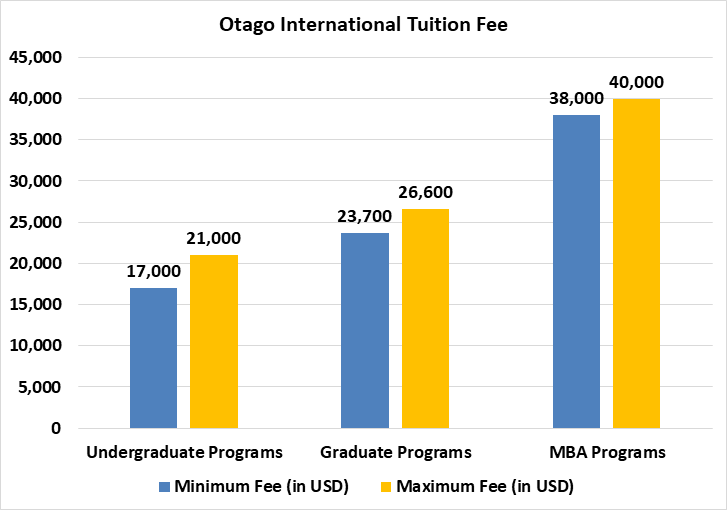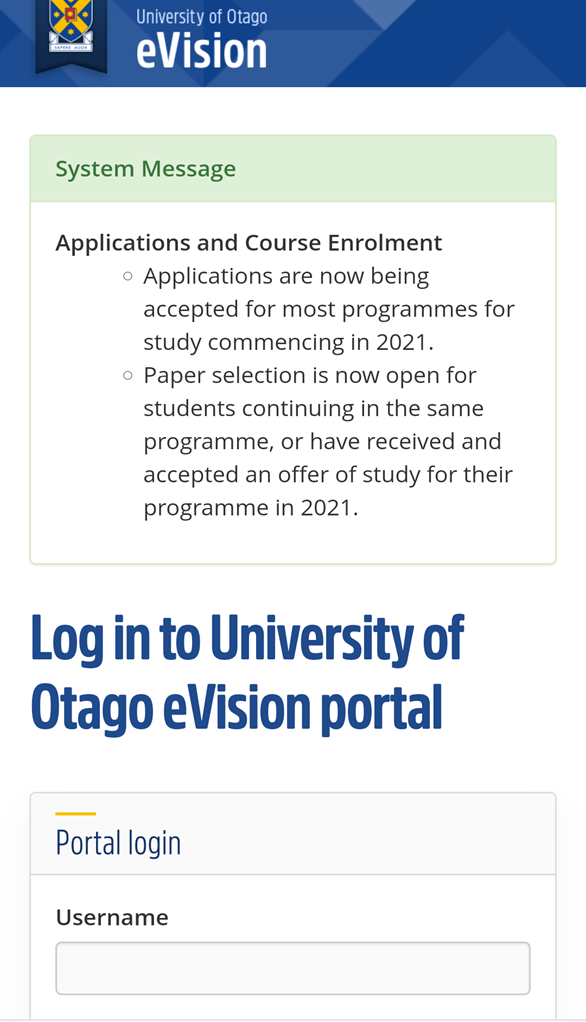

University of Otago Admissions 2025: Application Deadline, Requirements & Costs
 4.5 /5
4.5 /5111 acre campus
- Estd. 1869
University of Otago AdmissionsWhat’s new?
The University of Otago is the oldest in New Zealand. It started on a 100,000-acre land with only three professors in 1871, and additional endowment was provided to it in 1872 that enabled it to add new courses and widen the scope of the existing ones. Courses related to Law and Medicine were started in 1873 and 1875, respectively, and new courses were added later. A separate school for teaching 'Dentistry' started in 1907, and the 'Home Science School' was established in 1911.
New courses and curriculum have been incorporated by this university ever since then. Today, students aspiring for undergraduate and postgraduate courses in various streams find this university a popular choice. In 2016, the student count crossed 20,000, and since then, thousands of students have been applying for the courses every year. The Otago Provincial Council is the governing body of this university, and the current structure of the Council was drafted later. This university has been awarded 5-star plus ratings, which is the highest possible teaching and research rating. It is also considered one of the best in New Zealand when it comes to educational performance. It also has an unparalleled record in teaching that can be verified by its performance in the National Teaching Excellence Awards.
Courses Offered
What all courses are available to international students?
International students can pick from over 200 graduate and postgraduate programmes while studying at the University of Otago. They have the liberty to choose from more than 140 subjects and 200 subjects when it comes to undergraduate and postgraduate courses.
International students may find their dream course and specialisation through either of the four faculties:
The undergraduate and postgraduate programs offered by the University of Otago cover the following streams:
| Undergraduate Majors |
Postgraduate Majors |
|---|---|
| Medicine and Surgery |
Business Administration |
| Computer Science |
Entrepreneurship |
| Mathematics |
Business Data Science |
| Finance |
Commerce |
| Tourism |
Economics |
| Software Engineering |
Professional Accounting |
| Information Science |
Sustainable Business |
| Chemistry |
Philosophy |
| Electronics |
Finance |
| Commerce (Marketing Management) |
International Business |
| - |
Public Health |
| - |
Electronics |
| - |
Tourism |
Eligibility & Documents Required
What are the eligibility requirements?
To apply to the University of Otago, you must have the university entrance qualification irrespective of the programme you are seeking admission in. Some other requirements for the undergraduate courses are given below:
- The international students must have an IB (International Baccalaureate) with at least 24 points to be eligible for admission.
- A score of eight marks is required for students who have completed CIE, i.e. Cambridge International Examinations of Advanced GCE levels. The three most important, i.e. principal subjects, are considered while calculating this numerical score (this does not include General Paper) attempted on a single sitting or 2 A-level passes along with 2 Subsidiary passes of A-level attempted on a single sitting.
- A candidate who has completed one year of study in a tertiary educational institution approved by the university can also apply for the undergraduate courses.
- Indian students who appeared for the CBSE pattern senior school examination should score a minimum of 75% overall average to be eligible for the undergraduate courses. Students who appeared for the ICSE examination must have scored a minimum of 70% in the English subject to be eligible for these courses.
The eligibility requirements for the postgraduate courses are mentioned below:
- The candidates must at least complete a bachelor level course in the field they are willing to apply for a postgraduate course. A work experience in the relevant field can also increase the chances of their application getting selected.
- Apart from these basic requirements, the other postgraduate courses' eligibility criteria vary from programme to programme.
- The international candidates can apply to the PG programmes (both degree and diploma) at any convenient time once they have completed a degree level, i.e. bachelor course.
- Students who hold a PG diploma or honours degree are only eligible for the thesis of master's study. In some cases, the candidates who completed a degree level course can apply to the master's degrees or apply to the master's study, including both the thesis and the related coursework.
- A candidate must have completed a master's degree or have completed the honours degree with a first or higher second class to apply for a PhD programme. The area of research should be in the same field or discipline that the candidate is applying to.
The details of these requirements may vary with every programme and specialisation offered by the university.
Are there any English proficiency requirements as well?
All the aspirants residing in non-English-speaking countries need to prove language proficiency with the help of standardised English exams. The minimum language proficiency requirements for the undergraduate and postgraduate programmes offered at the University of Otago are given below:
| English Proficiency Tests |
Minimum Score Requirements |
|---|---|
| UG (Undergraduate) Programmes |
|
| IELTS (International English Language Testing System) |
6 and individual band scores should not be below 5.5 |
| TOEFL - Test of English as a Foreign Language (Online) |
80 and writing score should be at least 20 |
| TOEFL - Test of English as a Foreign Language (Offline, i.e. Paper-based) |
550 and writing score should be at least 4.5 |
| CPE (Cambridge Certificate of Proficiency in English) |
176 and scores of individual bands should not be below 169 |
| 58 and scores in communicative skills should not be below 50 |
|
| CAE (Cambridge Certificate in Advanced English) |
176 and scores of individual bands should not be below 169 |
| PG (Postgraduate) Programmes |
|
| IELTS (International English Language Testing System) |
6.5 and individual band scores should not be below 6 |
| TOEFL - Test of English as a Foreign Language (Online) |
95 and writing score should be at least 22 |
| TOEFL (Offline, i.e. Paper-based) |
587 and writing score should be at least 4.5 |
| CPE (Cambridge Certificate of Proficiency in English) |
176 and scores of individual bands should not be below 169 |
| PTE (Pearson Test of English) |
64 and scores in communicative skills should not be below 57 |
| CAE (Cambridge Certificate in Advanced English) |
176 and scores of individual bands should not be below 169 |
The programmes mentioned below require a higher score than the usual scores that are mentioned in the above tables:
- Graduate Diploma in Teaching or Master of Teaching and Learning - IELTS score of 7.5 and scores of individual bands should not be below 7.5.
- Postgraduate course in Surveying, Law, Dentistry: TOEFL (Online) - 102 with at least a score of 24 in every section. TOEFL (paper-based) - 600 and score of ‘Written English’ should be at least 5 or above. IELTS score of 7.5 with a minimum of 7 in all the individual bands.
- Master of Social and Community Work (Applied) - The IELTS score should be 7, and scores of all the individual bands should be at least 7 or above that.
Note: The additional tests of DET (Duolingo English Test), IELTS Indicator Test, and TOEFL iBT Special Home Edition are being accepted for the candidates who cannot appear for the regular English Proficiency Tests that are given in the above tables. The IELTS and TOEFL scores required to be eligible for the undergraduate and postgraduate courses are the same as the above tables. The candidates must secure at least a 100 DET score for the UG courses and a 110 DET score for the PG courses.
What all documents are needed for the application?
International students must attach a set of supporting documents while filling the online form. Therefore, they need to gather all the documents before commencing to fill the application form. The scanned copies of academic mark sheets that carry grades must be attached to the high school transcripts for undergraduate courses. Candidates need to provide scanned copies of their tertiary education transcripts while applying for the postgraduate courses. Attaching a high-school mark sheet is not necessary for the application of postgraduate courses.
The application of the candidates who have not completed their respective studies from the below-mentioned countries will not be processed or viewed until they submit their ECE (Educational Credential Evaluation) Report:
- USA
- United Kingdom
- South Korea
- Norway
- Malaysia
- Hong Kong
- Canada
- New Zealand
- Japan
- Fiji
- Australia
- South Africa
- Singapore
- Switzerland
However, the candidates may not need the ECE report if they submit their application via an agent approved by the University of Otago. For candidates who have completed their education from more than one country from where they have studied recently will be considered while considering if they require an ECE report. The application form required for the ECE report can be downloaded from the official ECE website at ece.org.
When the international students apply for a postgraduate or undergraduate course at the University of Otago, they will be asked to submit a certified copy of their birth certificate or passport as proof of their identity. The scanned copy can be submitted during the application process, but the candidates must carry the original copy to ensure the successful completion of their enrolment process.
Read Credential Evaluation: Why is it necessary? for more details.
Application & Tuition Fees
Is there any application fees?
The University of Otago does not charge any application fees from international students.
What is the fee structure of the courses offered by the university?
The tuition fees vary for each division and course at the University of Otago. The below graph shows the estimated tuition fees for undergraduate, postgraduate, and other courses.
Source: University of Otago
Important: Please note that the university had mentioned its fee in USD instead of NZD for easy understanding. Also note, tuition fees tend to change and may include charges that are not mentioned in the above diagram. Therefore, it is better to check the University of Otago's official website for understanding the actual fee structure.
Scholarships & Financial Aid
Is there any scholarship or financial aid available for international students?
International students living in or outside New Zealand joining a full-time undergraduate course will get a $10,000 (NZD) to cover some of their tuition fees and accommodation costs. It is meant for semester 1 and semester 2.
A scholarship woth $10,000 (NZD) is also provided to students who wish to apply for honours or master’s degree or postgraduate diploma in Sciences, Humanities, and Business programmes. The duration of this scholarship is 12 months. Interested students can apply for the scholarship in the second semester (if applicable) before April every year since the first semester's application date closes in the December month of the previous year.
International students who did not get admission to this university before and want to enrol for a full-time or full-year undergraduate course can get a scholarship between $2,500 and $5,000 (NZD) depending on their academic achievements. The students can apply for this scholarship before March.
Overseas students who apply for the research master’s programme can get a scholarship worth $15,000 (NZD) as a stipend. Apart from this, 50% of their tuition fees will be waived off, which will be limited to the domestic fee rates. International students who live in New Zealand or have selected the mode of online studying for the master’s programme (Coursework) will be entitled to receive a scholarship of $10,000 (NZD).
The University of Otago also provides the ‘Otago International Pathway Scholarship’ for students applying for the foundation year. This $4,000 (NZD) scholarship is given to enable the students to pay their tuition fees. International students who apply for the doctoral programmes will be entitled to a $27,000 (NZD) scholarship, and their tuition fees will also be waived off.
Admission Process
When do the admissions start?
The tentative closing dates for the applications of undergraduate and postgraduate studies are given below:
| Application Events |
Deadlines |
|---|---|
| Undergraduate Programmes |
|
| Closing date for applying for 2nd semester of the same year |
End April |
| Fresh applications |
Early August |
| Applications open for Degree in Dental and Medicine |
Mid September |
| Applications open for Degree in Law |
Early October |
| Applications closing date for academic courses that will start in the following year |
End October |
| Closing date for applying for the 1st semester of the following year |
Early December |
| New students/recommencing students can apply for a new programme, i.e. the 1st semester that starts in the following year on this date |
Mid December |
| Postgraduate Programmes |
|
| Applications closing date for applying for the second semester in the same year |
End April |
| Applications open for applying for PG diploma in Wildlife Management (PGDipWLM) |
Early October |
| Application for almost all the PG degrees for the following year will start on this date |
End October |
Note: The PhD studies do not have any specific enrolment or tentative application dates. Also, the deadlines might vary from the dates provided in the above tables as they are subject to frequent changes. Therefore, candidates must visit the university’s website to check the exact deadlines.
How do I start my application? Is there any ‘Pathway’ option available?
International students can apply for their choice by visiting the university's official portal for the undergraduate or graduate programmes of their choice.
First, the students need to choose their programme/course, confirm whether they are eligible as per the entry requirements and then submit the online form. After applying, the university will send a confirmation of the same, and you will have to accept their admission offer first to proceed further.
What are the steps to the application process? Does this involve an interview round?
After the COVID-19 Pandemic, two distinct processes have been created. One is for the students who are already living in New Zealand, and the second is for those who want to enrol in UG or PG courses online. There is no interview round before the final enrollment of the candidate.
Students who are already staying in New Zealand can adhere to these steps to get enrollment in their preferred degree programme:
Step 1: Accept the admission by visiting the website: https://evision.otago.ac.nz/, after which the university staff will be ready with your enrollment process.
Step 2: Choose your degree programme by taking help and advice from the ‘Student Development’ group.
Step 3: You should choose the papers you will study for completing the degree programme on eVision; you can also change them later if required.
Step 4: Now, you can pay tuition fees. Students who have a scholarship need to pay only the balance fees obtained after deducting their scholarship from the original fees.
Step 5: After payment of fees, the students should apply for a student VISA by attaching their admission offer letter. Upon getting a VISA, insurance (both travelling and medical) should be obtained as it is mandatory for all international students.
Step 6: On getting the insurance cover, the students can register for the international enrollment and orientation seminar, which is again compulsory for all the students. The students will have to carry their student VISA and passport while attending this seminar.
Step 7: Upon completing all the above steps, the students can declare their course and complete their enrollment process successfully.
Note: The enrollment process is similar for both UG and PG courses. For enrolling into the online courses, the students will have to follow a similar process, but instead of applying for the VISA, the students need to set up the technical requirements like internet speed, software/hardware applications, etc. to complete their programme online.
Here, the students will have to attend the online international enrollment and orientation seminar and complete the documentation by emailing a copy of their passport (certified) before course declaration.
The students who fail to meet the eligibility requirements can even opt for the ‘Pathway’ programme of Otago, where they will need to improve their English by attending the ‘Expert English Language Tuition’ that is provided at the Foundation Centre of Dunedin. The foundation year will boost the students’ confidence and prepare them for the future tenure of the course.
When will I hear from the university after I submit my application?
The University of Otago will let you know via eVision about your online admission status as soon as your documents and qualification requirements are verified. If your documents are incomplete, you will be contacted through eVision, and the status of your application will show ‘pending’ until you submit the necessary documents.
Student Diversity & Preferred Profile
What are the chances to get into this university?
The University of Otago is one of the top universities in New Zealand and is regarded as one of the best universities for completing an MBA degree. It ranks in the top 200 colleges for Accounting, Finance, Economics, and numerous other fields. Therefore, it would not be a cakewalk to get admission to this university. Good knowledge and understanding of the English language and having all the eligibility requirements are a must if you want to enter the UG and PG programmes offered by this university. The applications are screened carefully, and only those who have the required competence and scores will be able to get admission to one of its courses.
How many Indian/international students are studying at the University of Otago?
Over 20,000 students study across the various programmes offered by the University of Otago. Among them, over 2,500 students belong to other countries; international students from more than 100 countries study here. Also, 12.6% of international students are Indians. This means that over 2,188 students are from the remaining countries. The statistics of international students are as follows:
| Students by Residence |
Headcount |
|---|---|
| New Zealand |
17,500 |
| Total international students |
2,500 |
| Indian students |
312 |
Source: University of Otago
Part Time Work While Studying
Can I work while studying here?
If candidates possess the required qualification and skills, they can work part-time, provided that they hold a work Visa. Candidates may not have a VISA and still work only if they have a citizenship or permanent residence in New Zealand. The work can be of any sort provided that it does not hamper their studies. As per the work visa, the candidates can be employed for anywhere between 1 to 3 years while completing their programme. They can work up to 20 hours a week during the course, and work full time during holidays and vacations.
For more details, refer to:
Campuses & Accommodation
How many colleges and campuses does the university have?
The University of Otago has a total of five campuses and 14 residential colleges. The campuses are listed below:
- Dunedin
- Auckland
- Christchurch
- Invercargill
- Wellington
The 14 residential colleges are divided across 4 departments, viz. Business, health sciences, humanities, and sciences. The residential colleges of the University Of Otago are listed below:
- Aquinas College
- Arana College
- Caroline Freeman College
- Carrington College
- Cumberland College
- Hayward College
- Knox College
- St. Margaret’s College
- Salmond College
- Selwyn College
- Studholme College
- Te Rangi Hiroa College
- Toroa College
- University College
It provides numerous accommodation facilities to the international students who study at its various campuses. The university's accommodation is ideal for the newcomers until they get acquainted with the region's lifestyle and environment. The university is located near the campus and other important parts of the city, making it easy for the residing students to access everything.
Is on-campus housing available?
The students studying in the first year mostly prefer to stay in the University Residential College, a dormitory-style accommodation located inside or near the college campuses. Even the PG students can get accommodation in these residential colleges.
University Flats
Uni Flats are the flats owned and hosted by local students to accommodate several international students who study in the same or different programmes. It is more flexible and suited for international students who like to follow an independent lifestyle.
Private Flats
Students can also get accommodation in private flats shared by many students who wish to live together.
Studio Rooms
Students who like to have their room and bathroom prefer to live in studio rooms. Some of these studio rooms might even have a separate kitchen, but several students commonly share the living room and other areas.
Homestay Accommodation
Students can also stay in the house of a local family. However, the location might be away from the college campus, and the local family mostly provides meals to the student.
Private accommodation is costly, and therefore, most students prefer the accommodation provided by the university. As a result, it is in great demand and students will have to apply for this or any other accommodation as soon as they get enrolled in a particular course.
When to Apply?
The key dates to apply for accommodation are specified in the below table:
| Residence |
Opening Dates |
Closing Dates |
|---|---|---|
| Full year/Semester 1 (Feb-June) |
||
| Residential Colleges |
1st August |
30th September |
| UniFlats |
1st August |
1st November |
| Semester 2 (July-Nov) |
1 April |
1st June |
Note: Deadlines vary with progressive years. We encourage students to refer to the official website of the university to learn about the exact dates of the current year.
University Contact Information
Whom should I contact in case of any doubts?
For any details or queries, international students may contact the university at:
Postal address: Career Development Centre, University of Otago, PO Box 56, Dunedin 9054, New Zealand
Website address: www.otago.ac.nz
Email adress: careers@otago.ac.nz
Telephone number: +64 (3) 479 8244
- University of Otago Students review
- University of Otago Admission FAQs
University of OtagoStudents Ratings & Reviews
- Easy going
- Friendly
- Academically oriented
- 0% students never faced discrimination in this university
University of Otago Admission FAQs
Q: How many colleges and campuses does University of Otago have?
The University of Otago has a total of five campuses and 14 residential colleges. The campuses are listed below:
- Dunedin
- Auckland
- Christchurch
- Invercargill
- Wellington
The 14 residential colleges are divided across 4 departments, viz. Business, health sciences, humanities, and sciences. The residential colleges of the University Of Otago are listed below:
- Aquinas College
- Arana College
- Caroline Freeman College
- Carrington College
- Cumberland College
- Hayward College
- Knox College
- St. Margaret’s College
- Salmond College
- Selwyn College
- Studholme College
- Te Rangi Hiroa College
- Toroa College
- University College
It provides numerous accommodation facilities to the international students who study at its various campuses. The university's accommodation is ideal for the newcomers until they get acquainted with the region's lifestyle and environment. The university is located near the campus and other important parts of the city, making it easy for the residing students to access everything.
University of Otago
Student Forum
About the author
University of Otago
 University of Otago
University of Otago Aerial View
Aerial View Aerial View
Aerial View William James Building
William James Building Adams Building
Adams BuildingUniversity of OtagoContact Information
362 Leith Street, North Dunedin, Dunedin 9016, New Zealand
Dunedin ( Other - New Zealand)











